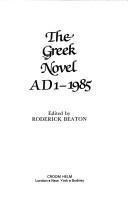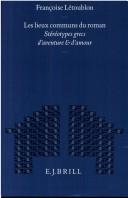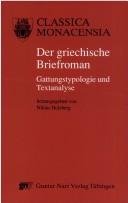| Listing 1 - 7 of 7 |
Sort by
|
Book
ISBN: 0691068380 9780691068381 9780691604640 0691604649 1400861845 Year: 1991 Publisher: Princeton, N.J. Princeton University Press
Abstract | Keywords | Export | Availability | Bookmark
 Loading...
Loading...Choose an application
- Reference Manager
- EndNote
- RefWorks (Direct export to RefWorks)
Literary form --- Romances, Byzantine --- Genres littéraires --- History and criticism. --- Greek fiction --- History --- 875-31 --- 875-31 Griekse literatuur: roman --- Griekse literatuur: roman --- History and criticism

ISBN: 0709950934 Year: 1988 Publisher: London : Croom Helm,
Abstract | Keywords | Export | Availability | Bookmark
 Loading...
Loading...Choose an application
- Reference Manager
- EndNote
- RefWorks (Direct export to RefWorks)
Greek fiction --- Byzantine fiction --- Greek fiction, Modern --- Roman grec --- Roman byzantin --- Roman grec moderne --- History and criticism --- Histoire et critique --- 875-31 --- 877.4 --- -Greek fiction --- -Greek fiction, Modern --- -Greek literature, Modern --- Greek literature --- Byzantine literature --- Griekse literatuur: roman --- Nieuwgriekse literatuur --- History and criticism. --- -Griekse literatuur: roman --- 877.4 Nieuwgriekse literatuur --- 875-31 Griekse literatuur: roman --- -877.4 Nieuwgriekse literatuur --- Greek literature, Modern

ISBN: 3823348604 Year: 1991 Volume: 2 Publisher: Tübingen : G. Narr,
Abstract | Keywords | Export | Availability | Bookmark
 Loading...
Loading...Choose an application
- Reference Manager
- EndNote
- RefWorks (Direct export to RefWorks)
Greek fiction --- Manuscripts, Greek (Papyri) --- Romances, Greek --- Transmission of texts --- Roman grec --- Papyrus grecs --- Roman courtois grec --- Transmission de textes --- Criticism, Textual --- Critique textuelle --- Romance fiction, Greek --- Transmission of texts. --- Greek fiction. --- Criticism, Textual. --- 875-31 --- 930.279 --- -Manuscripts, Greek (Papyri) --- Love stories, Greek --- -Greek romance fiction --- Greek literature --- Literary transmission --- Manuscript transmission --- Textual transmission --- Editions --- Manuscripts --- Greek papyri --- Papyri, Greek --- Manuscripts, Classical (Papyri) --- Manuscripts (Papyri) --- Griekse literatuur: roman --- Papyrologie --- -Griekse literatuur: roman --- 930.279 Papyrologie --- 875-31 Griekse literatuur: roman --- -Literary transmission --- Greek romance fiction --- Romances, Byzantine. --- Romances, Byzantine

ISBN: 9004097244 9004329196 9789004097247 Year: 1993 Volume: 123 Publisher: Leiden: Brill,
Abstract | Keywords | Export | Availability | Bookmark
 Loading...
Loading...Choose an application
- Reference Manager
- EndNote
- RefWorks (Direct export to RefWorks)
The author uses an extensive study of the five Greek novels preserved by tradition since Roman times (Chariton, Chaireas and Callirhoe , Longus, Daphnis and Chloe , Xenophon of Ephesus, Ephesiaca , Achilles Tatius, Leucippe and Clitophon , Heliodorus, Ethiopica ) to show how the novel form, from its origins, has been based upon the repetition of commonplaces, τόποι, which allows an interplay with the reader. The commonest of these commonplaces, love-Eros, provides the plot of the five novels, in an order which is itself topical: meeting and love at first sight, wounds of love and lovesickness, lovers separated, lovers put to the test by the sea and by pirates, lovers reunited. The heroes of Greek novels, always young, good-looking and well-born (even if their identities are left unclear), allow for easy reader identification. From Xenophon of Ephesus (the most primitive form of the novel) to the Ethiopica (a true work of art), the Greek novel had already explored all the main narrative possibilities of the genre.
Fiction --- Classical Greek literature --- Greek fiction --- Love stories --- Adventure stories --- Roman grec --- Roman sentimental --- Roman d'aventures --- History and criticism --- Translations into French --- Influence --- Histoire et critique --- Traduction en français --- Stéréotype --- --Roman d'amour --- --Roman d'aventure --- --Greek fiction --- Adventure stories, Greek --- Love stories, Greek --- 875-31 --- -Adventure stories, Greek --- -Love stories, Greek --- -Greek romance fiction --- Greek adventure stories --- Greek literature --- Griekse literatuur: roman --- History and criticism. --- -Griekse literatuur: roman --- 875-31 Griekse literatuur: roman --- -875-31 Griekse literatuur: roman --- Greek romance fiction --- Romance fiction --- Traduction en français --- Romances [Greek ] --- Romance fiction, Greek --- Adventure stories, Greek. --- Greek fiction. --- Romance fiction, Greek. --- Roman d'amour --- Roman d'aventure --- Greek fiction - History and criticism --- Adventure stories, Greek - History and criticism --- Love stories, Greek - History and criticism

Abstract | Keywords | Export | Availability | Bookmark
 Loading...
Loading...Choose an application
- Reference Manager
- EndNote
- RefWorks (Direct export to RefWorks)
875-6 --- 875-31 --- Epistolary fiction --- -Greek fiction --- -Greek language --- -Greek letters --- -Literary form --- -Form, Literary --- Forms, Literary --- Forms of literature --- Genre (Literature) --- Genre, Literary --- Genres, Literary --- Genres of literature --- Literary forms --- Literary genetics --- Literary genres --- Literary types (Genres) --- Literature --- Greek literature --- Classical languages --- Indo-European languages --- Classical philology --- Greek philology --- Epistolary novels --- Epistolary short stories --- Epistolary stories --- Novels, Epistolary --- Novels in letters --- Short stories, Epistolary --- Fiction --- Letters --- Griekse literatuur: brief --- Griekse literatuur: roman --- History and criticism --- -Theory, etc --- Style --- History --- -Epistolary fiction --- Greek fiction --- Greek language --- Greek letters --- Literary form --- Theory, etc. --- Style. --- History and criticism. --- -Griekse literatuur: brief --- -875-6 --- 875-31 Griekse literatuur: roman --- 875-6 Griekse literatuur: brief --- -875-31 Griekse literatuur: roman --- Form, Literary --- History and criticism&delete& --- Theory, etc
Book
ISBN: 0691042381 1322019584 9781400860487 1400860482 9780691042381 0691606919 9780691606910 0691635609 Year: 1989 Publisher: Princeton University Press
Abstract | Keywords | Export | Availability | Bookmark
 Loading...
Loading...Choose an application
- Reference Manager
- EndNote
- RefWorks (Direct export to RefWorks)
Using a reader-oriented approach, Shadi Bartsch reconsiders the role of detailed descriptive accounts in the ancient Greek novels of Heliodorus and Achilles Tatius and in so doing offers a new view of the genre itself. Bartsch demonstrates that these passages, often misunderstood as mere ornamental devices, form in fact an integral part of the narrative proper, working to activate the audience's awareness of the play of meaning in the story. As the crucial elements in the evolution of a relationship in which the author arouses and then undermines the expectations of his readership, these passages provide the key to a better understanding and interpretation of these two most sophisticated of the ancient Greek romances.In many works of the Second Sophistic, descriptions of visual conveyors of meaning--artworks and dreams--signaled the presence of a deeper meaning. This meaning was revealed in the texts themselves through an interpretation furnished by the author. The two novels at hand, however, manipulate this convention of hermeneutic description by playing upon their readers' expectations and luring them into the trap of incorrect exegesis. Employed for different ends in the context of each work, this process has similar implications in both for the relationship between reader and author as it arises out of the former's involvement with the text.Originally published in 1989.The Princeton Legacy Library uses the latest print-on-demand technology to again make available previously out-of-print books from the distinguished backlist of Princeton University Press. These editions preserve the original texts of these important books while presenting them in durable paperback and hardcover editions. The goal of the Princeton Legacy Library is to vastly increase access to the rich scholarly heritage found in the thousands of books published by Princeton University Press since its founding in 1905.
Description (Rhetoric) --- Greek fiction --- Reader-response criticism --- Rhetoric, Ancient. --- 875-31 --- 875 ACHILLES TATIUS --- 875 HELIODORUS EMESENUS --- Ancient rhetoric --- Classical languages --- Greek language --- Greek rhetoric --- Latin language --- Latin rhetoric --- Reader-oriented criticism --- Reception aesthetics --- Criticism --- Reading --- 875-31 Griekse literatuur: roman --- Griekse literatuur: roman --- 875 HELIODORUS EMESENUS Griekse literatuur--HELIODORUS EMESENUS --- Griekse literatuur--HELIODORUS EMESENUS --- 875 ACHILLES TATIUS Griekse literatuur--ACHILLES TATIUS --- Griekse literatuur--ACHILLES TATIUS --- History --- History and criticism --- Rhetoric --- Achilles Tatius. --- Heliodorus, --- Reader-response criticism. --- History and criticism. --- Romances [Greek ] --- Achilles Tatius --- Description (Literature) --- Rhetoric [Ancient ] --- Rhetoric, Ancient --- Achilles Tatius. -- Leucippe and Clitophon. --- Description (Rhetoric) -- History -- To 1500. --- Greek fiction -- History and criticism. --- Heliodorus, -- of Emesa. -- Aethiopica.
Book
ISBN: 9780190915452 0190915455 9780190915476 9780190915483 9780190915469 9780190857929 019091548X 0190915463 0190857927 0190915471 9780190857936 Year: 2019 Publisher: Oxford: Oxford university press,
Abstract | Keywords | Export | Availability | Bookmark
 Loading...
Loading...Choose an application
- Reference Manager
- EndNote
- RefWorks (Direct export to RefWorks)
This book addresses a particular and little-known form of writing, the prose dialogue, during the Late Antique period, when Christian authors adopted and transformed the dialogue form to suit the new needs of religious debate. Connected to, but departing from, the dialogues of Classical Antiquity, these new forms staged encounters between Christians and pagans, Jews, Manichaeans, and "heretical" fellow Christians. At times fiction, at others records of, or scripts for, actual debates, the dialogues give us a glimpse of Late Antique rhetoric as it was practiced and tell us about the theological arguments underpinning religious differences.By offering the first comprehensive analysis of Christian dialogues in Greek and Syriac from the earliest examples to the end of the sixth century CE, the present volume shows that Christian authors saw the dialogue form as a suitable vehicle for argument and apologetic in the context of religious controversy and argues that dialogues were intended as effective tools of opinion formation in Late Antique society. Most Christian dialogues are little studied, and often in isolation, but they vividly evoke the religious debates of the time and they embody the cultural conventions and refinements that Late Antique men and women expected from such debates.
Christian literature, Early --- Dialogue --- History and criticism. --- Religious aspects --- Christianity. --- Church history --- History and criticism --- Religious aspects&delete& --- Christianity --- Apostolic Church --- Church, Apostolic --- Early Christianity --- Early church --- Primitive and early church --- Primitive Christianity --- Fathers of the church --- Great Apostasy (Mormon doctrine) --- Dialog --- Drama --- 27 "00/04" --- 875-31 --- 239 --- 239 Apologetica. Polemische, controversiële theologie. Verdediging van het christendom --- 239 Apologetique. Theologie polemique et controversielle. Defense du christianisme --- Apologetica. Polemische, controversiële theologie. Verdediging van het christendom --- Apologetique. Theologie polemique et controversielle. Defense du christianisme --- 875-31 Griekse literatuur: roman --- Griekse literatuur: roman --- 27 "00/04" Histoire de l'Eglise--?"00/04" --- 27 "00/04" Kerkgeschiedenis--?"00/04" --- Histoire de l'Eglise--?"00/04" --- Kerkgeschiedenis--?"00/04" --- Aesthetics --- Poetry --- Medieval Latin literature --- Homer --- Gesture in literature --- Criticism and interpretation --- Christian literature, Early. --- Primitive and early church. --- 30-600. --- Homer - Criticism and interpretation --- Christian literature, Early - History and criticism --- Dialogue - Religious aspects - Christianity --- Church history - Primitive and early church, ca. 30-600 --- Homerus --- Hóiméar --- Hūmīrūs --- Homeros --- Gomer --- Omir --- Omer --- Omero --- Ho-ma --- Homa --- Homérosz --- האמער --- הומירוס --- הומר --- הומרוס --- هومر --- هوميروس --- 荷马 --- Ὅμηρος --- Гамэр --- Hamėr --- Омир --- Homère --- Homero --- 호메로스 --- Homerosŭ --- Homērs --- Homeras --- Хомер --- ホメーロス --- ホメロス --- Гомер --- Homeri --- Hema --- Pseudo-Homer --- Pseudo Omero --- Criticism and interpretation.
| Listing 1 - 7 of 7 |
Sort by
|

 Search
Search Feedback
Feedback About UniCat
About UniCat  Help
Help News
News